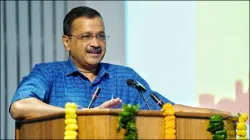Supreme Court to deliver verdict on Arvind Kejriwal's bail plea tomorrow in liquor policy case
The Delhi Chief Minister was arrested by the CBI on June 26. On August 14, the Supreme Court had refused to grant interim bail to Arvind Kejriwal in the case and sought a response from the probe agency on his plea challenging his arrest.

Delhi liquor policy case: The Supreme Court will deliver its verdict on Friday (September 13) on Delhi Chief Minister Arvind Kejriwal's pleas seeking bail and challenging arrest by the Central Bureau of Investigation (CBI) in the excise policy scam.
As per the cause list of September 13 uploaded on the apex court website, a bench headed by Justice Surya Kant is slated to pronounce the verdict.
Supreme Court reserves order on Kejriwal's bail plea
Earlier on September 5, the Supreme Court had reserved an order on the plea filed by Chief Minister Kejriwal seeking bail in the CBI corruption case stemming from the alleged excise policy scam. The matter was heard by a bench of Justices Surya Kant and Ujjal Bhuyan. Senior advocate Abhishek Manu Singhvi is representing Kejriwal in the top court.
During the hearing of the matter, Kejriwal's representative Singhvi said that the CBI is obsessed with everything except CrPC. He also stated that S.41A is not required when person is in custody, alternatively there is deemed S.41A through court.
While arguing on behalf of Delhi CM in the apex court, Singhvi said that it was the "insurance arrest" by the CBI which did not happen for two years. Justice Kant asked, “What is the offence alleged?” To this, Sighvi said, "Prevention of Corruption Act...I am not named in the FIR. I was called for questioning in April 2023, nearly 8 months after the FIR was filed, as a witness." Singhvi further said there is no evidence against Kejriwal and that he should be given bail.
Kejriwal conspired to privatise excise policy: CBI
The CBI has alleged that the Aam Aadmi Party (AAP) benefited from illicit funds generated through a criminal conspiracy related to the Excise Policy case. The CBI claims that Kejriwal, who is also the national convenor and overall in-charge of AAP, has been involved in the criminal conspiracy related to the formulation and implementation of policy from the start.
In its supplementary charge sheet, the CBI alleged that Kejriwal had a pre-conceived plan to privatise the Excise Policy and sought monetary support for the AAP in March 2021. This was during the formulation of the policy by the Group of Ministers (GoM) led by co-accused Manish Sisodia.
The CBI has further alleged that the AAP's statement on election expenditure for the Goa Assembly Elections 2022 is misleading as it only listed payments made through bank transactions, omitting substantial cash payments made to vendors, assembly managers, booth in-charges, and volunteers.
The investigation said that the illicit funds generated from the criminal conspiracy related to the policy were used to cover the election expenses of AAP.
Delhi excise policy case
The matter relates to alleged corruption and money laundering in the formulation and execution of the Delhi government's now-scrapped excise policy for 2021-22. It is alleged that the Delhi government's excise policy for 2021-22 to grant licences to liquor traders allowed cartelisation and favoured certain dealers who had allegedly paid bribes for it, a charge repeatedly refuted by the AAP. The policy was subsequently scrapped and Delhi Lt Governor VK Saxena recommended a Central Bureau of Investigation probe, following which the ED registered a case under the Prevention of Money Laundering Act (PMLA).
Also Read: Delhi liquor policy case: Arvind Kejriwal's judicial custody extended till September 25
Also Read: Supreme Court reserves order on Kejriwal's plea seeking bail in excise policy scam